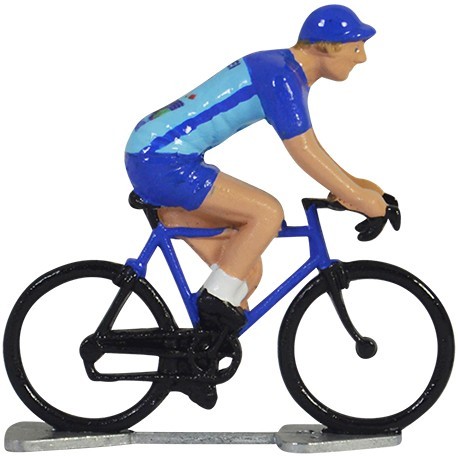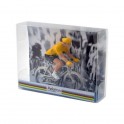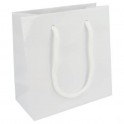No products
Mapei-GB K-WB - Miniature figurines
MGBWB
New product
Our miniature cyclists
Handpainted miniature cyclist with Mapei-GB jersey.
-Completely produced out of metal: bike + cyclist
-Dimensions: height 50mm x width 50mm
-Weight: 23 grams
4 Items
- Remove this product from my favorite's list.
- Add this product to my list of favorites.
Data sheet
| Type | K |
| Posture | Standard |
| Gender | Male |
| Colour | Yellow |
| Period | 1941-1990 |
| Material | Zamac |
| Height | 50mm |
| Width | 50mm |
| Depth | 16mm |
| Weight | 23g |
| Painted | Cyclist + Wheels + Bike |
More info
Johan Museeuw
Mapei was a professional team from 1993 to 2002. The Italian-Belgian team was sponsored by the Italian chemical manufacturer with the same name. The team management was in the hands of the Belgian Patrick Lefevere.
The team consisted mainly of Belgian and Italian riders: Abraham Olano, Adriano Baffi, Allan Davis, Andrea Noè, Andrea Tafi, Aurélien Clerc, Axel Merckx, Bart Leysen, Bernhard Eisel, Cadel Evans, Carlo Bomans, Charles Wegelius, Crescenzo D'Amore, Daniele Bennati, Daniele Nardello, Dario Cioni, David Cañada, Davide Bramati, Dmitri Moeravjev, Eddy Ratti, Elio Aggiano, Fabian Cancellara, Fabrizio Bontempi, Filippo Pozzato, Franco Ballerini, Frank Vandenbroucke, Frederik Willems, Gianluca Bortolami, Gianni Bugno, Gianpaolo Cheula, Graziano Gasparre, Jevgeni Petrov, Johan Museeuw, Kevin Hulsmans, László Bodrogi, Leif Hoste, Luca Scinto, Manuel Beltrán, Matthew Gilmore, Max van Heeswijk, Michael Rogers, Michele Bartoli, Nico Mattan, Oscar Camenzind, Óscar Freire, Paolo Bettini, Paolo Lanfranchi, Patrik Sinkewitz, Pavel Tonkov, Pavel Zerzáň, Rinaldo Nocentini, Robert Hunter, Scott McGrory, Stefano Garzelli, Stefano Zanini, Stijn Devolder, Tom Steels, Tony Rominger and Wilfried Peeters.
Mapei is considered to be the most successful team of the nineties. Eight times in nine years the team finished the cycling season in the first place in the UCI ranking. In addition, the team won the team classification in the World Cup five times.
The team, with classic riders such as Johan Museeuw and Michele Bartoli, was especially successful in the classic one-day races. Mapei was almost unbeatable. Especially in Paris-Roubaix, where the team won five times in six years. Twice (1996 and 1998) Mapei even won the first three places in Roubaix. The Mapei riders won a total of four times the World Road Championship for their respective countries. Mapei was less dominant in the big stage races. The only successful rider was the Swiss Tony Rominger, who won the Vuelta in 1994 and the Giro in 1995.
The official name of the team has been changed several times by different co-sponsors:
1993-1993 Mapei
1994-1994 Mapei-CLAS
1995-1997 Mapei-GB
1998-1998 Mapei-Bricobi
1999-2002 Mapei-Quick Step
After the 2002 season, Mapei withdrew from cycling sponsorship. The successor of the Mapei team in 2003 was the Belgian Quick Step-Davitamon team.
The most important victories of Mapei:
1994 World Cup general classification: Gianluca Bortolami
1994 Championship of Spain on the road: Abraham Olano
1994 Championship of Spain Time Trial: Abraham Olano
1994 Zurich Championship: Gianluca Bortolami
1994 Vuelta a España: Tony Rominger
1994 Vuelta a España: Tony Rominger
1994 World hour record: Tony Rominger
1995 World Cup general classification: Johan Museeuw
1995 Giro d'Italia: Tony Rominger
1995 Championship of Zurich: Johan Museeuw
1995 Tour of Flanders: Johan Museeuw
1995 World Championship on the road: Abraham Olano
1996 World Cup general classification: Johan Museeuw
1996 Championship of Belgium on the road: Johan Museeuw
1996 Championship of Spain on the road: Manuel Fernandez
1996 Paris-Roubaix: Johan Museeuw
1996 Tour of Lombardy: Andrea Tafi
1996 World Championship on the road: Johan Museeuw
1997 Championship of Belgium on the road: Tom Steels
1997 Championship of Italy on the road: Gianni Faresin
1997 Championship of Switzerland on the road: Oscar Camenzind
1998 Championship of Belgium on the road: Tom Steels
1998 Championship of Italy on the road: Andrea Tafi
1998 Championship of the Czech Republic on the road: Jan Svorada
1998 Paris-Roubaix: Franco Ballerini
1998 Tour of Lombardy: Oscar Camenzind
1998 Tour of Flanders: Johan Museeuw
1998 World Championship on the road: Oscar Camenzind
1999 Paris-Roubaix: Andrea Tafi
2000 Championship of Belgium on the road: Axel Merckx
2000 U.S. Championship on the road: Fred Rodriguez
2000 Championship of Hungary on the road: László Bodrogi
2000 Championship of Hungary time trial: László Bodrogi
2000 Championship of Italy on the road: Michele Bartoli
2000 Liege-Bastogne-Liege: Paolo Bettini
2000 Paris-Roubaix: Johan Museeuw
2000 Paris-Tours: Andrea Tafi
2001 Championship of Hungary time trial: László Bodrogi
2001 Championship of Italy on the road: Daniele Nardello
2001 Zurich Championship: Paolo Bettini
2001 World Championship on the road: Óscar Freire
2002 World Cup general classification: Paolo Bettini
2002 Championship of Belgium on the road: Tom Steels
2002 Championship of Hungary time trial: László Bodrogi
2002 Championship of Switzerland Time Trial: Fabian Cancellara
2002 Liège-Bastogne-Liege: Paolo Bettini
2002 Tour of Flanders: Andrea Tafi
Johan Museeuw
The Belgian Johan Museeuw was a pro from 1988 to 2004. He was nicknamed the Lion of Flanders and was considered to be the best classical rider of his generation. His biggest successes were three victories in the Tour of Flanders and Paris-Roubaix, two final victories in the World Cup, and once the World Championship on the road.
The teams for which Museeuw rode:
1988-1989 ADRenting
1990-1992 Lotto
1993-1994 GB-MG Maglificio
1994-2000 Mapei
2001-2002 Domo-Farm Frites
2003-2004 Quick Step-Davitamon
The first major victories in his career were two stage victories in the sprint in the Tour de France in 1990, including the stage with arrival on the Champs-Élysées. In the years that followed, he developed into a specialist in the classic one-day races. He also won twice the World Cup (1995 and 1996). Three times Museeuw won the cobble classic Paris-Roubaix, and also three times the Tour of Flanders.
With his three victories in the Tour of Flanders he and five other riders have the record. His his first victory was in a sprint of two against Frans Maassen in 1993. In the other two victories in 1995 and 1998 he finished solo.
Museeuw won Paris-Roubaix in 1996 before his teammates Gianluca Bortolami and Andrea Tafi, with whom he attacked for more than 80 km. The 3 rode a mini-squad time trial up to the finish. On the track in Roubaix the three didn't sprint. They almost came together over the finish line. Museeuw won the race. Patrick Lefevere had agreed this by phone with Mapei business owner Giorgio Squinzi.
In Paris-Roubaix in 2000 Museeuw rode 60 kilometers before the finish with Frankie Andreu in his wheel out of a smaller group. They took leader Max van Heeswijk back. After an attack on the cobblestones Museeuw took the lead and won the race. This second victory meant a lot to Museeuw. Two years earlier, when he fell during Paris-Roubaix, he was injured on the knee so badly and had been infected that the doctors considered amputating his leg. In his victory in 2000, Museeuw made his most famous gesture: at the finish he pointed to his stretched left leg.
In 2002 Museeuw escaped together with George Hincapie and Steffen Wesemann. The peloton hunted on the three and 44 kilometres before the finish the leading group was caught. Shortly after that Museeuw attacked again. He arrived alone and won Paris-Roubaix for the third time.
In 1996 Johan Museeuw won the World Road Championship in Lugano (Switzerland). He escaped together with the Swiss Mauro Gianetti which he defeated in the sprint.
Museeuw ended his career in 2004. In the end of his career there was a doping issue. At the beginning of 2007 he admitted that he had used doping to improve his performance. This is part of the mentality of that time. It is generally accepted that in that period almost all riders took doping.
Discover also our other miniature cyclists.
Accessories
Customers who bought this product also bought:
-
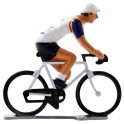
Banesto K-WB...
Our miniature racing cyclists Handpainted...
16,45 €
-
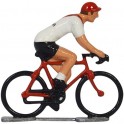
Faema K-WB -...
Our miniature racing cyclists Handpainted...
16,45 €
-
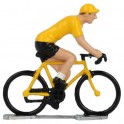
Yellow...
Our miniature cyclists Handpainted miniature...
16,45 €
-
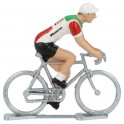
7 Eleven -...
Our miniature cyclists Handpainted miniature...
12,31 €
-

Once K-WB -...
Our miniature racing cyclists Handpainted...
16,45 €
-
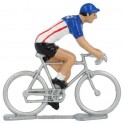
Brooklyn -...
Our miniature racing cyclists Handpainted...
12,31 €


